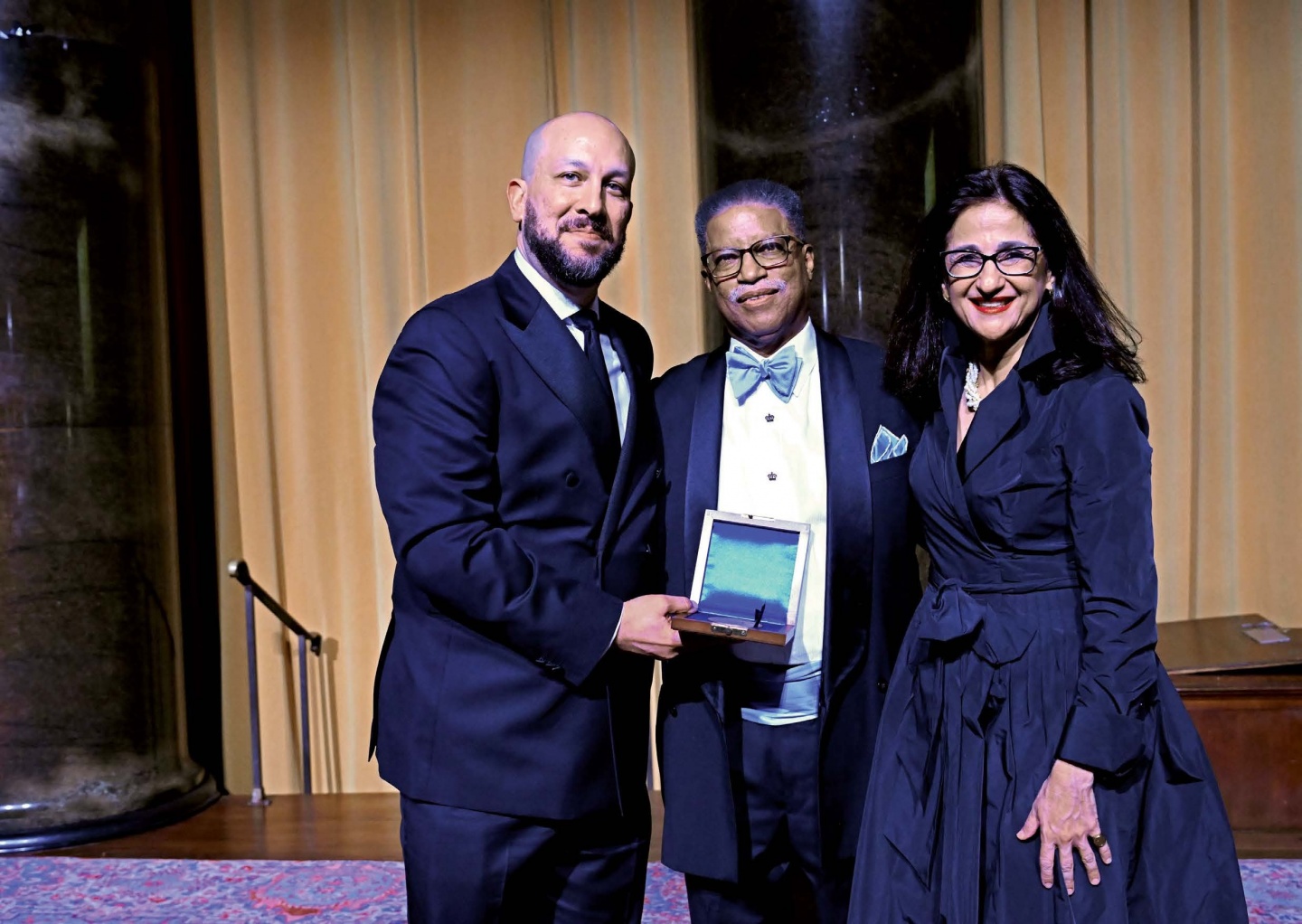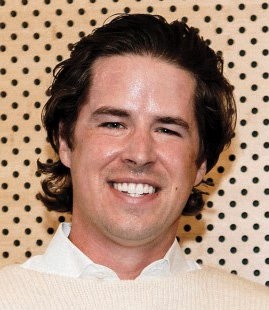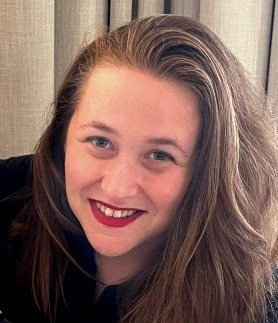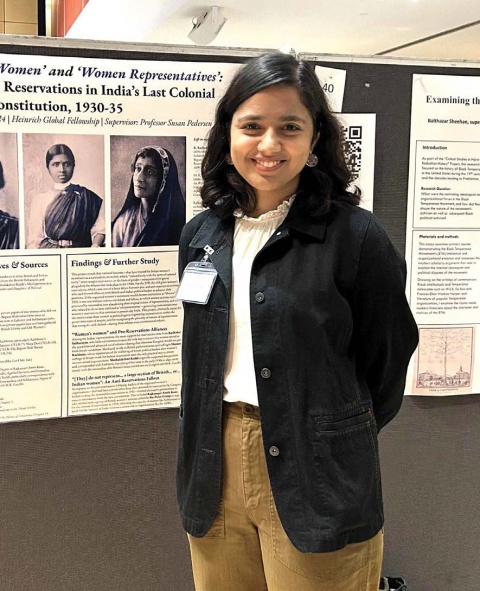Columbia College | Columbia University in the City of New York
News Briefs

At the dinner, left to right: Dean Josef Sorett, Van Amson and President Minouche Shafik.
Eileen Barroso
George Van Amson ’74, Columbia University trustee emeritus, inveterate mentor to students and alumni, and longtime Wall Street executive, was honored with the Alexander Hamilton Medal on November 16 at a standing-room-only black-tie dinner in Low Rotunda. The event raised more than $1.1 million, which will benefit College students by supporting the Core Curriculum and financial aid.
2024 John Jay Awards
The John Jay Awards Dinner, which celebrates alumni for their distinguished professional achievement, will be held on Wednesday, March 6. The 2024 honorees are Dr. Jennifer Ashton (née Garfein) ’91, VPS’00, HN’16, a physician, author and television medical correspondent; Jonathan D. Bram ’87, a founding partner at Global Infrastructure Partners; Dane E. Holmes ’92, chief administrative officer of KKR; Ai-jen Poo ’96, president of the National Domestic Workers Alliance and executive director of Caring Across Generations; and Anthony “Tony” Tutrone ’86, global head of alternative investments at Neuberger Berman.
Sherwin Award Recipients
T

Andrew Wood ’14

Abby Pritzker Pucker ’14
Wood, a VP at Morgan Stanley who is a wealth advisor in Beverly Hills, is an active member of the Young Leaders Council, Young Alumni Board and Columbia Club of Southern California. He has mentored dozens of Columbia students on career paths both informally and through the Columbia Athletics Finance Society and the Odyssey Mentoring Program.
Pritzker Pucker, an entrepreneur and cultural producer who is involved in initiatives at the nexus of the creative economy and civic engagement, established the Pritzker Pucker Internship Fund at the College to help students gain professional summer internship experiences in the fields of art, culture, media and tech.
Wadhwa Named Rhodes Scholar

Mrinalini Sisodia Wadhwa ’24
Wadhwa, who grew up in New Delhi and New York City, is double-majoring in history and mathematics. With an interest in the intersections of gender, religion and law, she is examining how religious knowledge is developed, transmitted and codified into law in the context of the British and French empires, with resonances for present-day debates over rights-based claims in our legal systems.
“Mrinalini has impressed many here at Columbia with her intellectual curiosity and generosity of spirit. I’m delighted to see her recognized in this way,” said Ariella Lang, associate dean of academic affairs and director of undergraduate research and fellowships. “Mrinalini is always the first to acknowledge the faculty and mentors who have supported her and challenged her thinking. I too want to recognize the faculty, advisors and alumni community who have given unstintingly of their time to support Mrinalini and a truly inspirational group of nominees and finalists.”
Addressing the Campus Impact of the Middle East Crisis
The acts of terrorism and violence perpetrated by Hamas on October 7 — and the ensuing war and humanitarian crisis in Gaza — reverberated across campus this past fall. While these events had a particularly profound impact on the Jewish, Muslim, Israeli, Palestinian and Arab communities on campus, it moved many students, faculty and others to participate in vigils, protests and vigorous debate on all sides of these issues. There were also reported incidents of antisemitism, Islamophobia and students being subjected to harassment and doxxing; in response, both Columbia College and the University at large have provided an array of resources and support.
“I want to make it absolutely clear that we do not tolerate antisemitism, Islamophobia, discriminatory harassment, hate speech or violence of any form in our community,” Dean Josef Sorett said in a message to the community on October 30. “These voices do not speak on behalf of, or accurately represent, our broader community.”
He continued: “In times of crisis, it bears repeating that Columbia College stands resolutely as a community committed to open dialogue and intellectual freedom, respectfully affirming cultural, political and religious diversity.”
The College has addressed the near-term impact of the conflict in a number of ways, including establishing a Campus Climate Response Team that meets daily during the semester to respond to student concerns in real time. Academic advisors are also assisting students who are directly impacted and who require academic accommodations, and College staff are providing one-on-one support for students and families targeted by doxxing.
“Forging a shared language with which to move forward in addressing these challenging issues has proven a formidable task,” Sorett said in a subsequent message sent on November 8: “We must listen to one another, strive for empathy and continually reflect on both the intent and consequences of our speech and actions.”
In support of that aim, the College — alongside Columbia Engineering, the School of General Studies and other University partners — is launching the Undergraduate Community Initiative. This series of events and dialogues for the Spring semester will focus undergraduates, faculty and staff on their responsibilities as members of a shared community, and in particular deepen their understanding of and commitment to the values of belonging, respect and service. (At press time, programming details were to be announced in January.)
At the University level, a Doxxing Resource Group was created in November to explore ways to support community members who are subject to this dangerous form of intimidation; a library of online resources also is available to offer guidance, access to policy information and more.
In addition, a Task Force on Antisemitism was formed to address the harmful impact of rising antisemitism on Jewish members of the Columbia community and to ensure that protection, respect and belonging extend to all members of the University community. The task force, which has 15 members, is co-chaired by Ester R. Fuchs, director of the Urban and Social Policy Program at SIPA; Nicholas Lemann, the Joseph Pulitzer II and Edith Pulitzer Moore Professor of Journalism; and David M. Schizer, the Harvey R. Miller Professor of Law and Economics.
Issue Contents
Published three times a year by Columbia College for alumni, students, faculty, parents and friends.
Columbia Alumni Center
622 W. 113th St., MC 4530, 4th Fl.
New York, NY 10025
212-851-7852
cct@columbia.edu
Columbia Alumni Center
622 W. 113th St., MC 4530, 4th Fl.
New York, NY 10025
212-851-7488
ccalumni@columbia.edu

